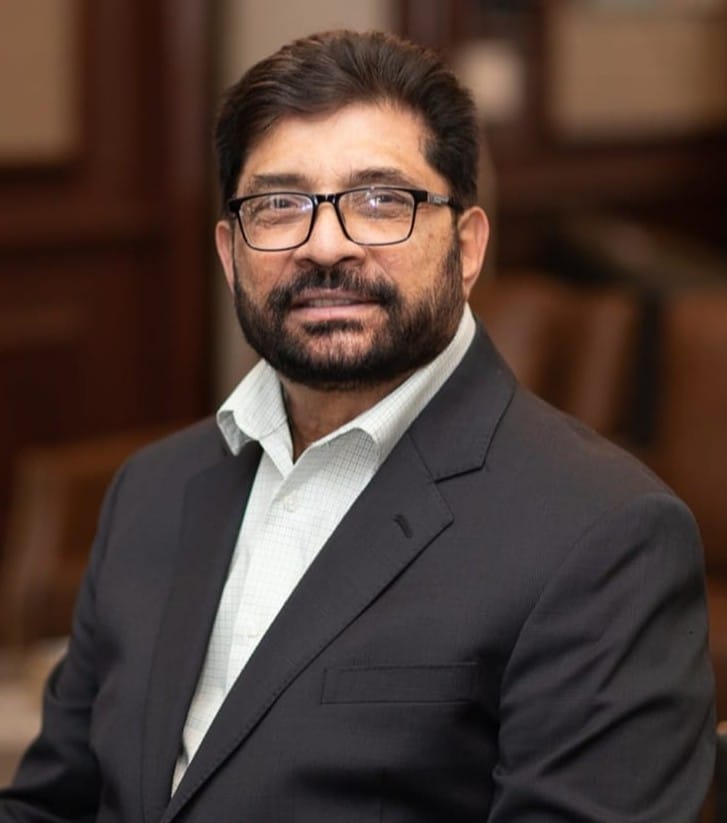By Ijaz Ahmad Khan
TORONTO — Known for his unwavering dedication to community welfare, Najam Naqvi has been working with diverse communities in Canada for decades and consistently focused on addressing critical societal needs through grassroots involvement, advocacy, and collaborative development.
Now, as the government pushes forward with progressive plans—including affordable housing, gender-based violence prevention, indigenous support, and sustainable infrastructure—Naqvi’s experience and leadership are more relevant than ever.
The visionary behind Peace Canada (www.peacecanada.ca), Naqvi motive of affordable and suitable housing for all means shelter, for all and hundreds of homes would also get their standard living facilities.
One of the central challenges facing urban and rural communities alike is access to affordable housing. Najam Naqvi can play a pivotal role in bridging the gap between policy and practice.
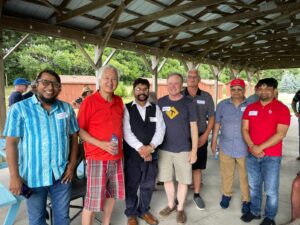
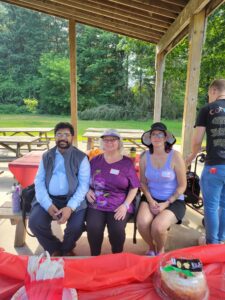
Through community partnerships, Naqvi aims to launch initiatives such as a Community Housing Helpdesk, designed to connect low-income families with rental support, housing aid, and legal resources. Additionally, his organization could help conduct needs assessments, enabling governments to identify housing shortages and target resources more effectively.
“Affordable housing is not just about shelter; it’s about restoring dignity and security to families,” Naqvi told 4thpillar penal comprising renowned journalists including Farooq Mirza, Ijaz Ahmad Khan and Shahid Ali.
About combating Gender-Based Violence, leading with awareness and action, Syed Najam Naqvi, familiar with Najam Naqvi, said that that with the National Action Plan to end Gender-Based Violence gaining momentum, he is exploring new programs to support survivors and prevent violence at the community level.
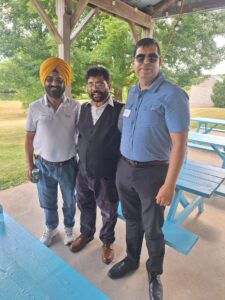
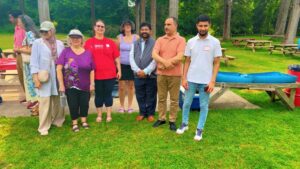
Among his proposed initiatives is the “Men against Violence” campaign, encouraging male community leaders to promote non-violence, accountability, and healthy relationships. He also envisions setting up a confidential response and referral service, offering counseling, legal aid, and emergency support in multiple languages.
“Gender-based violence is a societal problem, not a private one. Everyone must be part of the solution,” Naqvi emphasized during a recent roundtable discussion with Farooq Mirza, specially visited Toronto from New Jersey, USA.Supporting Indigenous Communities: A Commitment to Reconciliation
Reconciliation with Indigenous peoples remains a national priority, and Naqvi is determined to walk that path with respect and humility. Through Peace Canada, he plans to support language preservation efforts, promote cultural exchange programs, and advocate for better housing and water infrastructure in remote communities. These initiatives are being developed in close consultation with Indigenous elders and youth leaders.
“True reconciliation is more than symbolic,” he states. “It’s about sustained, inclusive development and protecting cultural identity,” Najam Naqi opined.
Infrastructure and Accessibility: Building Inclusive Cities
From safer sidewalks to accessible public buildings, infrastructure is at the heart of a connected society. Najam Naqvi envisions launching Community Revitalization Projects, where local volunteers and donors contribute to upgrading parks, libraries, and community centers.
One of his standout proposals is the Youth Innovation Fund, which will provide micro-grants to young leaders with ideas for improving public spaces and urban design. “Empowering youth to take charge of their environment fosters pride, leadership, and sustainable growth,” Naqvi explains.
Sustainable Transportation: Mobility for All
With Canada’s investment in public transit and active transportation through the Canada Public Transit Fund, Naqvi sees an opportunity to reduce inequality and environment hapharzad.
During conversation with Najam Naqvi, it helps highlight his vision and plans in a more personal and engaging way.
“We need to listen to the people” said Najam Naqvi on building stronger communities in Canada. For over two decades, Najam Naqvi, founder of PeaceCanada.ca, has worked tirelessly to empower communities across Canada. From housing advocacy to supporting Indigenous rights, Naqvi’s grassroots leadership is helping shape inclusive solutions to some of the country’s most pressing challenges.
We sat down with Mr. Naqvi to discuss his current projects, the government’s social priorities. Sayed Najam Naqvi, has been working relentlessly to strengthen the fabric of Canadian society—one neighborhood, one voice, and one initiative at a time. His decades-long efforts have focused on rejuvenating the community into a family bond, with a vision rooted in equality, accessibility, and empowerment.
Earlier this year, Najam Naqvi stepped into the national political arena by contesting in the federal elections under the Liberal Party banner. His campaign attracted widespread support—including from the sitting Prime Minister of Canada, who publicly endorsed him and joined him on the campaign trail. Though Naqvi narrowly lost by a minor margin, his presence in the election left a powerful imprint across the community.


He sits with great confidence over his work, not out of pride, but out of a lifetime dedicated to community service. Those who know him say he is fully committed to his mission and unwavering in his belief that meaningful change comes through local action.
“I am very much eager to have my role in the welfare of all communities, and I want to prove myself by delivering a positive outcome from the work we are carrying out for the good of the people,” Naqvi said.
During thorough discussion, Najam Naqvi threw light on his ongoing projects, political journey, and what the future holds for community-driven progress in Canada with a Q & A was also held that certainly draw a roadmap for which Mr. Naqvi is looking in great confidence to complete.
Q: Mr. Naqvi, you’ve been involved in community service for decades. What keeps you going?
Najam Naqvi:
It’s simple—the people. Every time I meet someone facing hardship, whether it’s lack of housing or limited access to education, I feel more determined to do something about it. I believe that when a community starts to feel like a family, only then do we start healing and growing together. That has always been my goal.
Q: You recently ran in the federal elections. How would you describe that experience?
Najam Naqvi:
It was both humbling and energizing. Being chosen to represent community voices on a national level is a serious responsibility. And having the Prime Minister himself support my campaign—well, that was a strong message that our work matters. Although I didn’t win, losing by such a close margin, I know the impact was real. I met thousands of people and heard their stories. That connection doesn’t end with an election.
Q: Your quote about community welfare was widely appreciated. Can you explain what it means to you personally?
Najam Naqvi:
It reflects my deep commitment. I’m not looking for recognition—I’m looking for results. I want to prove, through action, that positive outcomes are possible when we put the welfare of the people first. That’s why I continue to work, day in and day out, regardless of whether I hold a political title.
Q: How are you aligning your work with national priorities like housing, gender-based violence prevention, and Indigenous support?
Najam Naqvi:
We’ve launched several community programs through Peace Canada. For example, our Community Housing Helpdesk connects people with housing support services. In response to the national strategy on gender-based violence, we’re initiating a “Men Against Violence” campaign to engage men in awareness and prevention. And in Indigenous communities, we’re working respectfully with elders and youth on language preservation, clean water advocacy, and digital learning tools.
Q: Infrastructure and accessibility have also been key issues for you. What are your plans in this area?
Najam Naqvi:
We’re rolling out Community Revitalization Projects—repairing parks, upgrading public libraries, and improving access for persons with disabilities. Another initiative I’m proud of is the Youth Innovation Fund, which gives small grants to young people with ideas to improve their neighborhoods. Empowering youth is critical to building long-term, sustainable change.
Q: Transportation is often overlooked in community development. What’s your approach?
Najam Naqvi:
Transportation affects everything—jobs, education, healthcare. That’s why we’re pushing for affordable and accessible public transit under our Transit for All campaign. We’re also working with schools to support active commuting programs, encouraging kids to walk or cycle where possible, promoting both health and sustainability.
Q: How do you decide which initiatives to pursue next?
Najam Naqvi:
We let the community lead. We hold consultations, listen to concerns, and take action based on real needs. I don’t believe in top-down solutions. Solutions must come from the ground up. My role is to amplify those voices, connect them with resources, and help turn ideas into real progress.
Q: What’s next for you and Peace Canada?
Najam Naqvi:
We’re expanding. More outreach, more partnerships, more community-led projects. I also want to get more youth and new Canadians involved, because diversity is our strength. The door is always open. If you have a project idea, if you want to volunteer—we’re here and we’re listening. This strategy aims to ensure everyone has access to affordable and suitable housing with National Action Plan to End Gender-Based Violence as this plan includes various initiatives to address and prevent gender-based violence.
He said the Support for Indigenous Communities the government has programs focused on housing, water infrastructure, education, and language preservation for First Nations. He said Liberals have committed to engaging with municipalities to improve housing and infrastructure, including accessible buildings.
About the Canada Public Transit Fund, he said that such fund provides predictable funding for public transit and active transportation, supporting the development of more sustainable and inclusive communities.

